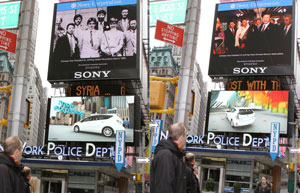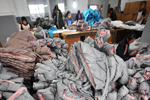Call for changes in US export controls
Updated: 2012-02-15 13:28
(China Daily)
|
|||||||||||
On Feb 10, the Wall Street Journal published an article titled "Aerospace report hits rules", calling for changes in US export controls. Full texts below:
Satellite makers and their suppliers are stepping up demands for changes to US export controls, painting in stark economic terms the impact of what they insist are regulations curbing their ability to compete for commercial orders against European and other foreign satellite makers.
On Tuesday, industry trade group Aerospace Industries Association (AIA) will release details of a report concluding that US export controls on commercial satellites may have cost up to 27,000 American jobs and $21 billion in lost sales for aerospace companies since the late 1990s.
The AIA's over 330 members include Boeing Co, Lockheed Martin Corp and Northrop Grumman Corp and specialty suppliers such as Kaman Aerospace Corp and Allfast Fastening Systems Inc.
The study is the latest in a long effort by US aerospace companies to persuade Congress to ease export controls governing aerospace technology. Their data represent the most detailed effort yet to quantify the impact of the erosion of US commercial-satellite sales globally.
The report aims to highlight the industry's economic significance and stress its employment potential, including in businesses dependent on aerospace spending.
The report is expected to be presented Tuesday to the House Foreign Affairs Committee hearing on potential reforms to US export controls. It blames many of the US industry's current woes on what satellite makers contend are outdated export-control laws and regulations that have allowed foreign makers to gain market share.
From 1999 to 2009, the study indicates the US share of global commercial-satellite sales fell by about 50 percent to, on average, one out of every three large satellites delivered.
The US share in previous years was roughly two out of three satellites delivered.
The laws have been a topic of debate on Capitol Hill for at least a decade. Two years ago, the Barack Obama administration proposed a broad revamping of such controls, seeking to raise the walls around the most sensitive US technologies while lowering them for commercial-satellite parts and many other components.
But that drive has largely stalled, confronted by congressional ambivalence about approving changes that could spark partisan attacks for allegedly helping US foes gain access to sensitive space technologies.
Now, aerospace industry leaders hope to tie their campaign for legislative action to broader election-year arguments about the importance of growing overall US payrolls. With Pentagon spending expected to be significantly cut in coming years, and suppliers of all sizes more dependent on commercial orders, industry officials worry the negative fallout from export controls could be more dramatic than in the past.
In a recently released survey of its members, AIA found that more than 90 percent of companies that responded "indicated a connection between export controls and (an) eroding space industrial base". More than 70 percent directly blamed current export restrictions for lost sales.
"Instead of preventing other countries from developing space capabilities," according to AIA, "barriers to export for US satellite products have prompted numerous countries to create indigenous space capabilities and leverage their growing market share" to spur research and innovation.
European manufacturers and parts suppliers have benefited from US policy, partly by offering lower-cost satellites free of components subject to US export controls. In some cases, they have teamed with Chinese rockets to offer enticing deals to satellite operators.
Such projects also have been spurred by the growing sophistication and reliability of European and Chinese space hardware.
Industry officials believe that in the long run, the health of many US subcontractors in particular may be threatened.
That's because they generally are more vulnerable than prime contractors to foreign price-competition, as well as to the added complications of complying with the existing export control regime.
Frequently, the prospect of needing State Department approval for foreign shipments scares away some customers, according to Stanley Kennedy, an executive vice president of Comtech AeroAstro Inc., based in Ashburn, Virginia. Export controls also "could make it cost prohibitive for smaller companies" to compete overseas, he said.









